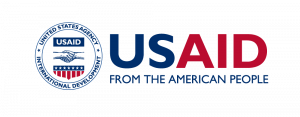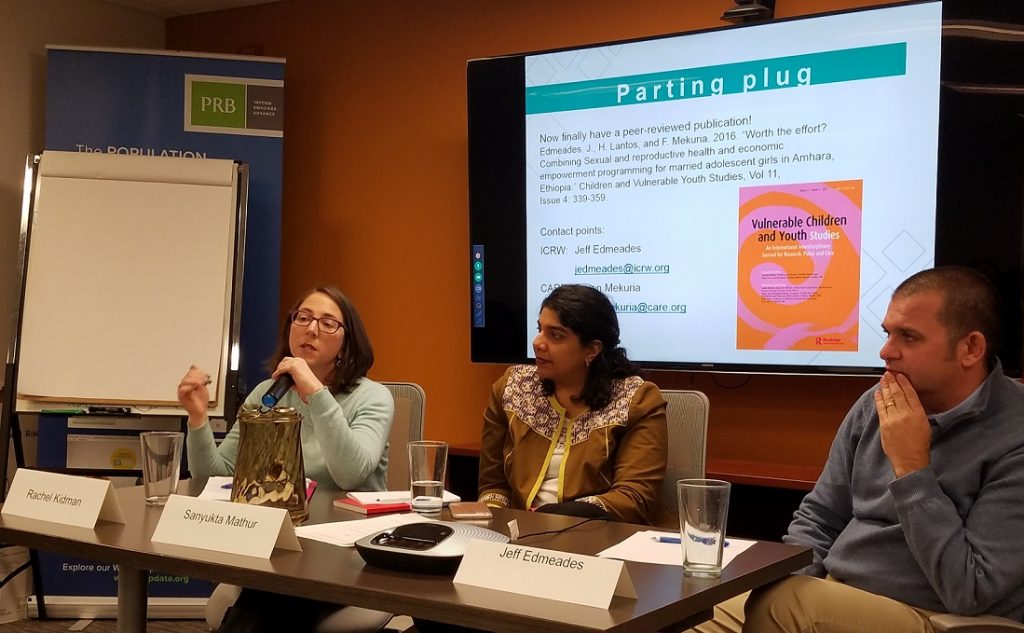In commemoration of the 2023 16 Days of Activism Against Gender-Based Violence international campaign, the IGWG has revised its Intimate Partner Violence and Family Planning: Intersections and Opportunities for Action infographic, originally published in 2016. This infographic explores the impacts of intimate partner violence (IPV) on family planning (FP), as well as offers recommendations for addressing IPV and improving FP outcomes.
IPV
Addressing Gender-Based Violence Through Cash Transfer Programming Part II
Addressing Gender-Based Violence Through Cash Transfer Programming Part II: Supporting Adolescent Girls and Working in Humanitarian Settings
Click here to view a recording of the event.
More money, less violence? This event was the second part in the IGWG’s Gender-Based Violence (GBV) Task Force series on the use of cash transfer approaches to address GBV and other reproductive health outcomes.
Part II of this series delved more deeply into the specifics of cash transfers for addressing GBV. What are the strengths and shortcomings for this type of intervention to reduce GBV? How have cash transfers been incorporated into GBV programs in humanitarian settings? What are the considerations for applying cash transfer interventions to reduce GBV when working with adolescent girls?
Panelists and Presentations
- Berk Özler, “How Can Cash Programming Contribute to Efforts Aiming to Reduce GBV?” Slides pending publication; click here for his current publications related to cash transfers.
- Kathryn Falb, “Cash Transfers and GBV in Humanitarian Emergencies.” Slides pending publication; findings from the full study will be available on the What Works to Prevent Violence website in Spring 2019.
- Karen Austrian, Population Council, “Testing the Effects of Cash v. Cash Plus Empowerment Programs for Young Adolescent Girls in Kenya: Midline Evaluation Results from the Adolescent Girls Initiative―Kenya.”
- Plus, a special lightning talk from Tenzin Manell, Women’s Refugee Commission, presenting the Toolkit for Optimizing Cash-based Interventions for Protection from Gender-based Violence.
This event built on Part I, held on September 17. That event introduced cash transfer approaches, highlighted some of the evidence around the effectiveness of cash transfers for addressing GBV, and sparked a discussion of the pathways through which cash transfer programming can affect violence-related outcomes. More information from that event is here.
Addressing Gender-Based Violence Through Cash Transfer Programming
The Gender-Based Violence Task Force of the Interagency Gender Working Group Presents
Addressing Gender-Based Violence Through Cash Transfer Programming
Monday, September 17, 2018
This event series brings attention to the intersection between economic empowerment interventions―specifically cash transfers―and gender-based violence (GBV) and reproductive health outcomes. This webinar was the first of a two-part series.
This part focused on sharing the latest evidence on cash transfers as an effective intervention for preventing GBV, specifically intimate partner violence, in developing countries. Other topics covered include how cash transfers can affect violence-related outcomes through casual pathways.
Panelists and their presentations included:
- Kathy Lindert of The World Bank Group
- “Designing & Delivering Cash Transfers: Overview” PowerPoint (2.6 MB)
- Lori Heise of Johns Hopkins University
- “Reducing Violence at Scale: A Mixed Methods Review of Cash Transfers and Intimate Partner Violence in Low- and Middle-Income Countries” PowerPoint (2.3 MB)
- “Reducing Violence at Scale: A Mixed Methods Review of Cash Transfers and Intimate Partner Violence in Low- and Middle-Income Countries” PDF Paper (550 KB)
- Audrey Pettifor of the Gillings School of Global Public Health
- “Cash Transfers Can Reduce Intimate Partner Violence Among Adolescent Girls” PowerPoint (1.8 MB)
A recording of the event can be found here.


Addressing Gender-Based Violence Through Cash Transfer Programming Part I
Addressing Gender-Based Violence Through Cash Transfer Programming Part I
View presentations and the event recording here.
This series, hosted by the Gender-Based Violence (GBV) Task Force of the Interagency Gender Working Group (IGWG), explored the use of cash transfer approaches (an economic empowerment strategy) to address GBV and other reproductive health outcomes. Moving from theory to practice, the event included presentations on results from recent evidence reviews, as well as promising programmatic examples of cash transfer interventions and their impacts.
Part I of the series, on September 17, provided an introduction to cash transfer approaches and feature the latest evidence on cash transfers as an effective economic empowerment strategy for preventing GBV, specifically intimate partner violence. Presenters also explored the causal pathways through which cash transfer programming can affect violence-related outcomes in low- and middle-income countries, including among adolescent girls.
Panelists and their presentations included:
- Kathy Lindert, World Bank, “Designing & Delivering Cash Transfers: An Overview”
- Lori Heise, Johns Hopkins University, “Reducing Violence at Scale: A Mixed Methods
Review of Cash Transfers and Intimate Partner Violence in Low- and Middle-Income
Countries” - Audrey Pettifor, Gillings School of Global Public Health, “Cash Transfers Can Reduce
Intimate Partner Violence Among Adolescent Girls”
Keep an eye out for Part II of this series, which will take place in late October. This event will focus on design and implementation features of cash transfer approaches that are effective at improving GBV outcomes, including specific work in humanitarian settings.
What’s Family Planning Got to Do With It? Intimate Partner Violence + Family Planning Intersectionalities and What We Can Do about Them
Join us at the Sexual Violence Research Initiative (SVRI) Forum in Rio de Janeiro to exchange ideas, network, and learn about what approaches work in linking intimate partner violence and family planning. This satellite event will showcase findings from the Passages Project’s new report, “Exploring the Linkages between Intimate Partner Violence and Family Planning,” and highlight the latest research from Promundo’s Program P.
Come ready to share your insights and expertise on what is known about the determinants of intimate partner violence and family planning–including the influence of social and gender norms–and promising, up-and-coming approaches that address this nexus.
Refreshments will be provided.
Questions? Email Francesca at francesca.quirke@tearfund.org
Child, Early and Forced Marriage and Intimate Partner Violence

This Gender-Based Violence Task Force event on March 6, 2017 explored the connections between child marriage and intimate partner violence (IPV). Presenters included researchers and development experts from ICRW, Population Council, and Stony Brook University. The event opened with Rachel Kidman of Stony Brook University, who used open source DHS data to analyze the relationship between child marriage and IPV. Her findings showed that globally, the data show a strong correlation between the two, and that national marriage laws do not seem to reduce the child marriage prevalence. Sanyukta Mathur from the PopCouncil shared results from the DREAMS initiative in Kenya, which surveyed young Kenyan women and their experience with IPV. Jeff Edmeades of ICRW, the final presenter, highlighted findings from the TESFA program in Ethiopia, which showed that young brides are more vulnerable to violence. The event ended with a Q&A session with all three panelists, moderated by Charlotte Feldman-Jacobs of PRB.
Event Presentations and Materials
- Using Global Data to Examine Child Marriage, IPV and Legal Protection – Rachel Kidman, Stony Brook University
- Experience of Violence and Association with HIV Risk Amoung Young Kenyan Women in the Context of the DREAMS Initiative – Sanyukta Mathur, PopCouncil
- Child Marriage, Couple Communication and IPV: Insights from the TESFA Project – Jeffrey Edmeades, ICRW
- Event Notes
- Video Recording
- Photos
Resources and Projects Referenced in Presentations
- Journal Article: Child marriage and intimate partner violence: a comparative study of 34 countries – Rachel Kidman
- Reducing HIV Risk among Adolescent Girls and Young Women: Implementation Science around the DREAMS Initiative – PopCouncil
- TEFSA Supporting Married, Widowed, and Divorced Adolescents – CARE
Additional Materials
- Improving the Lives of Married Adolescent Girls in Amhara, Ethiopia: A Summary of the Evidence – This brief summarizes the main findings from the TEFSA evaluation
- Worth the effort? Combining sexual and reproductive health and economic empowerment programming for married adolescent girls in Amhara, Ethiopia – This is the publication that Jeffrey mentioned at the end of his presentation
- Out of the Shadows: Child Marriage in Ethiopia – Series of stories developed around the issues covered by the TESFA project


